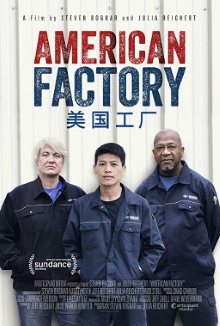
So this just won the Oscar for Best Documentary but got somewhat lost amidst the fuss over Parasite. Yet it’s quite remarkable in its own right. Taking its subject as the opening of a factory in the US owned by a Chinese company, it tries to present itself as equal parts an American and a Chinese film. American directors Steven Bognar and Julia Reichert were assisted in this by Chinese filmmakers Yiqian Zhang and Mijie Li, resulting in extraordinary access to the Chinese side of the story.
This film covers the establishment of an automotive glass factory owned by China’s Fuyao in Dayton, Ohio at the site of a closed General Motors plant. The news is greeted with enthusiasm for providing jobs to the local community and Fuyao has promised to fully hand over management to Americans eventually. Indeed the first CEO of the company is American. However numerous problems emerge once they start operations. The company’s management style is incompatible with American individualism and even simple communication proves problematic. The factory loses money as their efficiency and quality fall well work of what their China plant can achieve. The management tries to send American supervisors to China to learn from their methods but the Americans end up being mostly shocked or bemused by how different things work in China. Things get worse when workers try to organize a union presence. Finally the chairman brings in a Chinese CEO to turn things around.
It’s common for documentaries of this type to follow workers around and get their point of view. What’s surprising is that the filmmakers are allowed to follow around Fuyao’s founder and chairman Cao Dewang, film union meetings and participate in the trip to China. It’s clear that while at least some of the workers are upset with the company and accuse them of unfair labor practices, the company itself is proud of what they have achieved and genuinely believe that they have done nothing wrong. This is a case of both parties thinking that they are in the right and are happy to present their case to the makers of this film. I think it’s worth taking a moment to appreciate how much work it must have taken to earn this level of trust from both sides in order to create this extraordinary film. I also love that while the directors are obviously sympathetic to the workers’ plight and are eager to point out the ridiculousness of trying to impose Chinese discipline on American workers, they also refrain from casting Cao into the role of the stereotypical villain. As one worker notes, times have changed and the good old GM days will never come back and it’s impossible to blame any one person for that.
To be honest, this film held no real surprises for me and I even predicted that it would with the factory opting for as much automation as feasible. Still, it’s hilarious to watch the Americans all but gaping in astonishment as they take in the over the top performances put on by Fuyao’s China staff for the Chinese New Year celebrations. It’s also fascinating to see how the company’s internal vote on whether or not to let a union in play out. The film does include footage of employees accusing the company of some serious regulatory breaches but I presume that if there’s any truth in them, given the public profile of the factory, it would be straightforward enough for the authorities to investigate thoroughly and impose punishment as appropriate. Apart from that however I feel that the greatest failing on the Chinese side is that they truly are insufferably arrogant in assuming that their practices are plainly superior to that of the Americans in all respects, and are not simply different.
As an individualist myself, I am of course critical of the hypocrisy in Fuyao’s propaganda that they are all one family. As the documentary shows, the company is quick to dismiss staff that they find don’t perform as well as they expect, which doesn’t amount to much of a family. But this is a pretty standard complaint that applies to many American companies as well. On the whole, it’s hard to argue against the fact that Fuyao’s arrival in the city is a net good even if it’s not quite everything that the local community hoped for. So kudos to the directors for a rather fair portrayal of both sides, making this an excellent documentary,